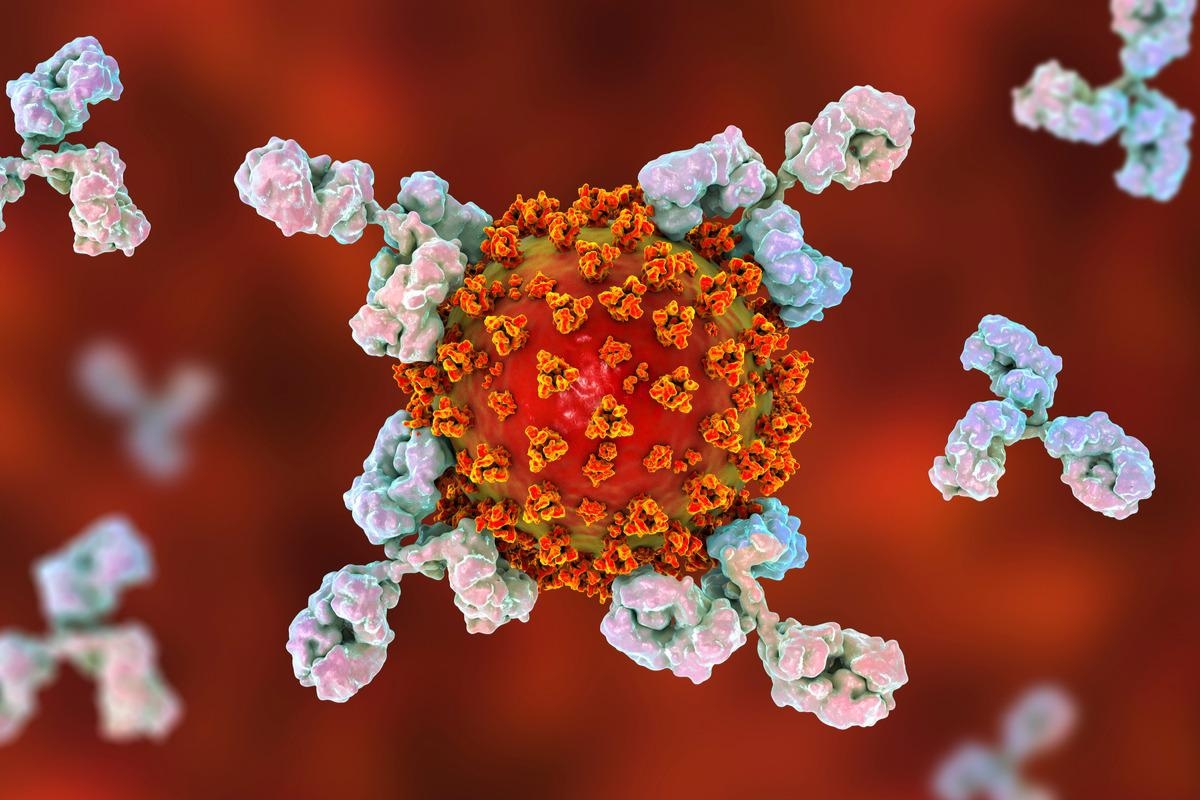Several severe acute respiratory syndrome coronavirus 2 (SARS-CoV-2) variants have emerged since the coronavirus disease 2019 (COVID-19) pandemic. These variants can be combated by thoroughly evaluating the long-term efficacy of immune response in both the vaccinated and recovered individuals. The World Health Organization’s (WHO) campaign for Vaccine Equity is a global challenge to ensure equal allocation of vaccines across all countries. Several recent studies have reported that post-infection immunity is long-acting, durable, and protective.
 Study: Long-Term Persistence of IgG Antibodies in recovered COVID-19 individuals at 18 months and the impact of two-dose BNT162b2 (Pfizer-BioNTech) mRNA vaccination on the antibody response. Image Credit: Kateryna Kon/Shutterstock
Study: Long-Term Persistence of IgG Antibodies in recovered COVID-19 individuals at 18 months and the impact of two-dose BNT162b2 (Pfizer-BioNTech) mRNA vaccination on the antibody response. Image Credit: Kateryna Kon/Shutterstock
Individuals who have recovered from COVID-19 infections are advised to undergo a complete vaccination similar to naïve individuals who have no previous history of infection. However, whether two doses of the vaccine are required for recovered individuals or one dose would be sufficient is still questionable.
Real-time data have indicated that a single dose of vaccine can adequately enhance immunity in recovered individuals who have protective immunity compared to a double dose. However, ideal vaccine dosing regimens or recall responses have not been studied in recovered individuals.
Studies suggest that vaccination can elicit a more specific and higher magnitude response focused on the spike-receptor binding domain (S-RBD) instead of the Nucleocapsid (NCP) as compared to natural infection.
A new study published in the pre-print server medRxiv* assessed the dynamics of IgG titers over 18 months in patients who had recovered from COVID-19 infections during March 2020. The study also investigated the impact of two doses of the BNT162b2 (Pfizer-BioNTech) vaccination on the antibody titers of these patients as compared to those patients who had not received any dose of the vaccine.
About the study
The study involved patients based in the Umbria region of Italy who had tested positive for SARS-CoV-2 by real-time polymerase chain reaction reverse transcription (RT-qPCR). The patients had to fill out a questionnaire to provide information regarding their COVID-19 related clinical history, symptoms, and treatment undertaken. Also, blood samples were collected from those patients recruited in the study.
The antibody titers of the patients were analyzed from May 2020 to January 2021. The first blood sample collected in May 2020 after infection in March 2020 was defined as T0. After that, the samples were analyzed at three months (T1), five months (T2), seven months (T3), eight months (T4), and ten months (T5) post-infection.
The study participants were divided into two groups, group A comprised of recovered patients vaccinated with two doses of the BNT162b2 vaccine, and group B comprised unvaccinated recovered patients. The presence of anti-S-RBD antibodies was analyzed from February 2021 to September 2021 in both groups. Also, detection of anti-NCP antibody was carried out for group B to determine the persistence of infection-induced immunity that was not generated by vaccination.
Study findings
The results indicate that a double dose vaccination in recovered individuals had a major impact on the antibody titers. The antibody titers were found to increase rapidly post-vaccination, but the rise was short-lived, which explains the importance of boosters. The IgG titers were reported to increase 161 times while the IgM titers increased by an amount of 0.773.
However, unvaccinated recovered individuals were found to test positive for anti-S-RBD antibodies 18 months post-infection. No cases of reinfection were reported in these individuals despite the emergence of multiple mutant strains that brought about several waves of infection. Most recovered individuals also tested positive for anti-NCP antibodies at 18 months post-infection.
Therefore, the current study demonstrates that immunity conferred by SARS-CoV-2 infection lasted longer as compared to vaccination. Although the antibodies are boosted significantly post-vaccination, this response is short-lived. Also, testing for anti-NCP antibodies can help analyze the type of existing immunity in an individual. Further research is required to determine the dose regimen and timing of vaccination to ensure adequate immune response in an individual.
Limitations
The study had certain limitations. First, the sample size of the study was small. Second, simultaneous antibody titer assessment for both NCP and S-RBD would have given better results for the comparative analysis. However, the S-RBD assay received emergency approval in late 2020.
*Important notice
medRxiv publishes preliminary scientific reports that are not peer-reviewed and, therefore, should not be regarded as conclusive, guide clinical practice/health-related behavior, or treated as established information.
-
Puya-Dehgani-Mobaraki et al. (2022) "Long-Term Persistence of IgG Antibodies in recovered COVID-19 individuals at 18 months and the impact of two-dose BNT162b2 (Pfizer-BioNTech) mRNA vaccination on the antibody response". medRxiv. doi: 10.1101/2022.01.18.22269349. https://www.medrxiv.org/content/10.1101/2022.01.18.22269349v1
Posted in: Medical Science News | Medical Research News | Disease/Infection News
Tags: Antibodies, Antibody, Assay, Blood, Coronavirus, Coronavirus Disease COVID-19, covid-19, Efficacy, Immune Response, immunity, Pandemic, Polymerase, Polymerase Chain Reaction, Receptor, Research, Respiratory, SARS, SARS-CoV-2, Severe Acute Respiratory, Severe Acute Respiratory Syndrome, Syndrome, Transcription, Vaccine

Written by
Suchandrima Bhowmik
Suchandrima has a Bachelor of Science (B.Sc.) degree in Microbiology and a Master of Science (M.Sc.) degree in Microbiology from the University of Calcutta, India. The study of health and diseases was always very important to her. In addition to Microbiology, she also gained extensive knowledge in Biochemistry, Immunology, Medical Microbiology, Metabolism, and Biotechnology as part of her master's degree.
Source: Read Full Article
